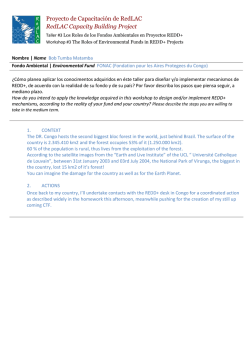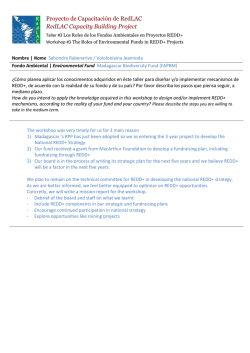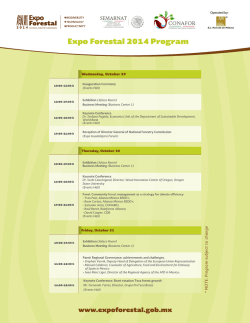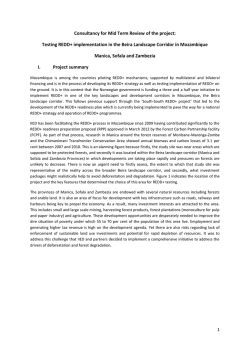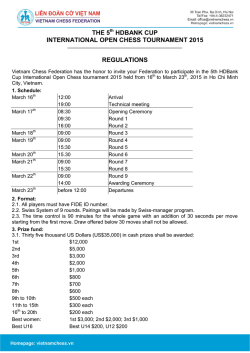
Submission to the Standing Committee of Finance
Submission to the Standing Committee of Finance regarding financing for forests It is Towards Transparency’s recommendation that the Standing Committee on Finance consider and acknowledge the significant challenges that corruption poses to the coherence and coordination of financing for forests, and includes within the Working Paper recognition of these challenges, as well as recommendations and examples of best practices to combat corruption risks. Below we present evidence drawn from a corruption risk assessment of forest financing in Vietnam, with a particular focus on REDD+. The full report can be downloaded here. Background Towards Transparency (TT), Transparency International’s (TI) national contact in Vietnam, is working to ensure that forestry-related government agencies and local authorities in Vietnam adhere to high standards of transparency and accountability, and enable civil society to effectively monitor REDD+ and other forest financing mechanisms. Under these conditions, TT believes that REDD+ payments will be far more likely to meet their intended objectives. REDD+ and forest payment environmental services (PFES) initiatives are set to contribute significant financial resource for forest protection and development Vietnam. In 2012, the income from PFES alone was 540 million USD (1,130.8 billion VND) for the whole country and the allocated budget for forestry sector was around 550 million USD (1,210 billion VND). However there are significant risks that corruption might hamper the effective implementation of this funding. Vietnam’s forestry sector has been beset with illicit activity in recent years as the result of Illegal logging and other forestry violations are on the rise throughout the country. According Forest Protection Department in 2013, there were 27,253 cases of violations of forestry legislation. TT recognises that there has been some movement towards instituting necessary reforms to avoid corruption in REDD+ and other forms of forest financing such as PFES. However anti-corruption measures tend only to be evidenced on paper and anti-corruption enforcement has traditionally been weak in Vietnam. TT therefore felt it necessary to conduct an in-depth analysis to identify the risks of corrupt practices in the management of PFES and REDD+ financial flows, in order to identify the solutions required to ensure that forest financing in Vietnam achieves its intended results. Research process and methodology TT’s research was guided by a methodology developed by TI and included in the manual Keeping REDD+ clean: a step-by-step guide to preventing corruption, which provides a framework to identify and prioritise the corrupt practices that pose the greatest risk to REDD+ — practices that have the greatest impact and are the most likely to occur. In Vietnam TT adapted the methodology to its local context. This was achieved through deskbased research, and consultation meetings with key stakeholders involved in REDD+ and anti-corruption at both national and provincial levels. This research was supplemented by field visits to Lam Dong and Son La provinces, where pilot REDD+ or Payment for Environmental Services activities are underway. Through the research process a risk map of potential corruption risks for REDD+ was drawn up by identifying together with key national and local stakeholders key concerns for corruption in REDD+, assessing and prioritising them. The highest scoring risks were analysed in-depth in order to understand the underlying causes and possible solutions. Relevant findings REDD+ policy and practice is still under development in Vietnam. However, because the scheme falls under the national forestry programme in Vietnam, research participants felt that it would inherit many of the same risks as more longstanding forestry projects such as the PFES, the 327 Re-Greening Uplands Programme, and the Five Million Hectare Reforestation Programme. The research participants identified as a major concern that REDD+ funds may be allocated unfairly and improperly as a result of corrupt practices. As a result, those who are intended to benefit from REDD+ - including forest dwelling communities who live in and protect the forest – will miss out thereby undermining the purpose of REDD. This research process identified a number of potential corrupt practices for REDD+ including: Risks of fraud, bribery and kick-backs, with fund recipients providing incorrect information to get REDD+ funds, Government authorities receiving bribery or kickback money from recipients to approve REDD+ funds. Embezzlement of REDD+ funds achieved through faking invoices and other documents and using false beneficiaries. Bribery and collusion/fraud to approve reports that show inaccurate information, falsify documents or hide information Recommendations for greater participation and improved complaints services for communities In order to address the corruption risks for forest financing in Vietnam, TT is currently working with partner organisations and local authorities in Lam Dong and Quang Binh provinces to pilot monitoring approaches for PFES and REDD+ funds. Using Public Expenditure Tracking Survey and Community Scoring card tools, TT hopes to effectively engage local citizens and stakeholders to track PFES and REDD+ financial from where it is disbursed by central government authorities, through local government, to end users at the commune level. TT intends to provide local communities and NGOs with sufficient information about the amount of PFES and REDD finance allocated to particular services in their area and to evaluate whether the finance have been spent to realize the intended objectives. TT is also piloting approaches with local NGOs and the Vietnamese provincial authorities’ Legal Advice Centres in Lam Dong and Quang Binh provinces to support citizens to lodge and process any complaints related to corruption experienced in forest financing. Following the successful piloting and review of the effectiveness of these anti-corruption measures, TT hopes and expects to continue to work with the Government of Vietnam and REDD stakeholder’s in order to have these tools in the place to do oversight implementation and financial flow of each REDD project nationally.
© Copyright 2026
